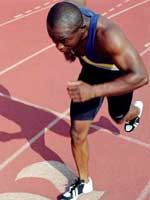|
|
 Athletic
competition is not a test of supplements, performance boosters
or drugs. It is a test of a person's ability to excel in his/her
area of sport. The real keys to physical performance are genetics,
training and good, healthy nutrition. The trend observed is
that a sports man reaching the top is influenced by these
three factors. Having a family background of athletes. Second,
he must get the best training i.e. be selected and coached
by good professional trainers and thirdly his diet must be
made up of a good balance of all the essential nutrients namely
water, minerals, vitamins, carbohydrates, proteins and necessary
fat and fiber. The simple advice I can give you is that you
make sure that you are eating a good variety of foods like
fruits, vegetables, cereals, dhals and pulses and milk and
milk products. Egg, non-veg and little fats. All the recent
research has proved that the long-standing belief that protein
and amino acid supplements build muscle is a myth and therefore
it is dying. These supplements continue to capture the attention
and money of athletes because people think of protein and
amino acids as the ingredients from which muscle are made.
Therefore they believe the higher the supply of protein and
amino acids, the bigger the muscles. But that's not the way
muscles are built. The protein and amino acids you consume
don't go directly to build muscle. Excess proteins in the
diet are converted to glucose and fat and not to muscle. Exercise,
sufficient fluid and a balanced, healthy diet build muscles. Athletic
competition is not a test of supplements, performance boosters
or drugs. It is a test of a person's ability to excel in his/her
area of sport. The real keys to physical performance are genetics,
training and good, healthy nutrition. The trend observed is
that a sports man reaching the top is influenced by these
three factors. Having a family background of athletes. Second,
he must get the best training i.e. be selected and coached
by good professional trainers and thirdly his diet must be
made up of a good balance of all the essential nutrients namely
water, minerals, vitamins, carbohydrates, proteins and necessary
fat and fiber. The simple advice I can give you is that you
make sure that you are eating a good variety of foods like
fruits, vegetables, cereals, dhals and pulses and milk and
milk products. Egg, non-veg and little fats. All the recent
research has proved that the long-standing belief that protein
and amino acid supplements build muscle is a myth and therefore
it is dying. These supplements continue to capture the attention
and money of athletes because people think of protein and
amino acids as the ingredients from which muscle are made.
Therefore they believe the higher the supply of protein and
amino acids, the bigger the muscles. But that's not the way
muscles are built. The protein and amino acids you consume
don't go directly to build muscle. Excess proteins in the
diet are converted to glucose and fat and not to muscle. Exercise,
sufficient fluid and a balanced, healthy diet build muscles.
Highly
professional athletes in America have their own physicians
and labs where blood levels are tested and monitored and only
then supplements necessary in the exact doses are given. You
cannot therefore determine whether you need more or less protein
on your own and neither can your trainer just advice you to
take these supplements without detailed tests.
|
|